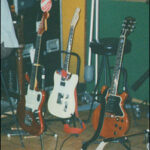In the realm of young adult fiction, stories that strike a chord are often those that resonate with genuine emotion and relatable experiences. “[Book Title – Replace with a fitting title if known, or keep it generic for now]” emerges as a novel that largely succeeds in this endeavor, primarily through its exploration of music and the contrasting yet complementary personalities of its two protagonists. While a questionable plot twist slightly detunes the overall harmony, the majority of the book offers a surprisingly enjoyable and lighthearted melody, driven by the authentic passion for music, particularly the soulful strumming of guitar notes, that binds its characters.
Lyla, presented initially as the epitome of effortless perfection, is a cellist whose talent seems innate. Her cello playing, spurred by the loss of her mother, is technically brilliant but feels increasingly hollow. Through Lyla’s perspective, the façade of flawless musicianship crumbles, revealing a young woman disconnected from the very essence of her music. She embodies technical mastery, but the true passion, the soul within the notes, feels muted, lost somewhere amidst the pressure from her father and the subtle manipulations of her possessive friend.
Conversely, Tripp, the guitar-playing outcast, bursts onto the scene as a breath of fresh, unconventional air. He is the character that truly animates the narrative, injecting humor and genuine heart into the story. Tripp is endearingly awkward, a loner with a dry wit and an unwavering devotion to his guitar. His passion for music is palpable; he doesn’t just play guitar, he embodies it. The description of Tripp as “…just a bit odd. In a really interesting way,” perfectly captures his quirky charm and the intriguing depth beneath his surface. His connection to music is so profound, so visceral, it makes the reader yearn to understand the language of guitar notes as deeply as he does.
It is through Tripp’s raw, unfiltered musicality that Lyla begins to rediscover her own. He reminds her to feel the music, to let it flow from her heart, to imbue each note with genuine emotion rather than simply executing technically perfect sequences. Their connection blossoms in the shared space of a practice room, initially divided by schedules – Tripp on odd days, Lyla on even, leading to playful nicknames, Mr. Odd and Ms. Even. Starting with simple, written exchanges, their friendship evolves, revealing shared vulnerabilities and a mutual understanding that extends beyond the realm of musical notes.
However, the narrative isn’t without its discordant notes. Lyla’s “best friend,” Anna, introduces an element of unnecessary friction, behaving more like an overbearing romantic partner than a supportive friend, creating a somewhat jarring and misplaced possessiveness. More significantly, the unexpected plot twist, arriving late in the story, feels jarring and undermines the genuine connection built throughout the narrative. This twist, and the subsequent rushed resolution, detract from the otherwise harmonious flow of the book. The final act feels truncated, failing to provide the satisfying crescendo the story deserved.
Despite these shortcomings in the latter part of the book, the preceding chapters are genuinely captivating. The pacing is brisk and engaging, the dual perspectives of Lyla and Tripp offer valuable insights into their individual journeys, and the incorporation of lyrics, musical notations, and messages adds a unique layer to the storytelling. Tripp, with his dry humor and relatable awkwardness, is a standout character, leaving a lasting positive impression.
In conclusion, while “[Book Title]” falters slightly in its final movements due to a questionable twist and hurried ending, the overwhelming majority of the book sings with authenticity and charm. The exploration of musical passion, particularly through the lens of guitar notes and Tripp’s infectious enthusiasm, coupled with engaging characters and a lighthearted tone, makes it a worthwhile read. Focusing on the strengths of the narrative, it’s easy to overlook the flawed ending and appreciate the resonant melody of connection and self-discovery that permeates most of this novel. While not flawlessly executed, the book earns a solid recommendation for readers who appreciate stories about music, friendship, and finding your own authentic rhythm.

